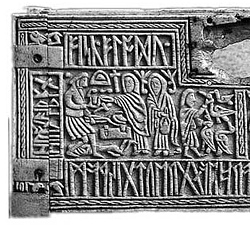Anglo-Saxon paganism




Anglo-Saxon paganism refers to the religious beliefs and practices followed by the Anglo-Saxons, a group of Germanic tribes who migrated to what is now England and parts of southern Scotland, from the 5th century until the Christianization of Anglo-Saxon England, which was largely complete by the late 7th century. This form of paganism was closely related to the religious practices of other Germanic peoples of the time and shared many similarities with Norse paganism, which is better documented due to later sources.
Beliefs and Practices[edit]
Anglo-Saxon paganism was polytheistic, worshipping a pantheon of deities, with gods such as Woden, equivalent to the Norse Odin, and Thunor, equivalent to Thor, being among the most venerated. These deities represented various aspects of life and the natural world, including war, fertility, and weather. The religion also had a strong belief in spirits and supernatural entities inhabiting the natural world, such as elves and dwarfs.
Rituals and religious practices were an integral part of Anglo-Saxon paganism. These included sacrifices of animals and possibly humans, feasting in honor of the gods, and the erection of standing stones or wooden totems. Sacred sites, often natural features such as rivers, trees, and hills, played a significant role in worship and rituals.
Christianization[edit]
The process of Christianization began in the late 6th century, primarily through the efforts of missionaries sent by Pope Gregory the Great, such as Augustine of Canterbury. Over the following centuries, Christian beliefs and institutions gradually replaced Anglo-Saxon paganism. This transition was not always peaceful, with instances of resistance and relapse into paganism. However, by the 8th century, Christianity had become the dominant religion among the Anglo-Saxon elite, and by the late 7th century, it had spread widely among the general population.
Legacy[edit]
Despite its replacement by Christianity, Anglo-Saxon paganism has left a lasting legacy in England. Many place names, elements of folklore, and aspects of popular culture can be traced back to this early period. The study of Anglo-Saxon paganism is primarily through archaeological evidence, as there are limited contemporary written sources on the subject. This has led to a reliance on later Christian writings, which may present a biased view of the pagan past.
See Also[edit]
Ad. Transform your life with W8MD's Budget GLP-1 injections from $49.99


W8MD offers a medical weight loss program to lose weight in Philadelphia. Our physician-supervised medical weight loss provides:
- Weight loss injections in NYC (generic and brand names):
- Zepbound / Mounjaro, Wegovy / Ozempic, Saxenda
- Most insurances accepted or discounted self-pay rates. We will obtain insurance prior authorizations if needed.
- Generic GLP1 weight loss injections from $49.99 for the starting dose of Semaglutide and $65.00 for Tirzepatide.
- Also offer prescription weight loss medications including Phentermine, Qsymia, Diethylpropion, Contrave etc.
NYC weight loss doctor appointmentsNYC weight loss doctor appointments
Start your NYC weight loss journey today at our NYC medical weight loss and Philadelphia medical weight loss clinics.
- Call 718-946-5500 to lose weight in NYC or for medical weight loss in Philadelphia 215-676-2334.
- Tags:NYC medical weight loss, Philadelphia lose weight Zepbound NYC, Budget GLP1 weight loss injections, Wegovy Philadelphia, Wegovy NYC, Philadelphia medical weight loss, Brookly weight loss and Wegovy NYC
|
WikiMD's Wellness Encyclopedia |
| Let Food Be Thy Medicine Medicine Thy Food - Hippocrates |
Medical Disclaimer: WikiMD is not a substitute for professional medical advice. The information on WikiMD is provided as an information resource only, may be incorrect, outdated or misleading, and is not to be used or relied on for any diagnostic or treatment purposes. Please consult your health care provider before making any healthcare decisions or for guidance about a specific medical condition. WikiMD expressly disclaims responsibility, and shall have no liability, for any damages, loss, injury, or liability whatsoever suffered as a result of your reliance on the information contained in this site. By visiting this site you agree to the foregoing terms and conditions, which may from time to time be changed or supplemented by WikiMD. If you do not agree to the foregoing terms and conditions, you should not enter or use this site. See full disclaimer.
Credits:Most images are courtesy of Wikimedia commons, and templates, categories Wikipedia, licensed under CC BY SA or similar.
Translate this page: - East Asian
中文,
日本,
한국어,
South Asian
हिन्दी,
தமிழ்,
తెలుగు,
Urdu,
ಕನ್ನಡ,
Southeast Asian
Indonesian,
Vietnamese,
Thai,
မြန်မာဘာသာ,
বাংলা
European
español,
Deutsch,
français,
Greek,
português do Brasil,
polski,
română,
русский,
Nederlands,
norsk,
svenska,
suomi,
Italian
Middle Eastern & African
عربى,
Turkish,
Persian,
Hebrew,
Afrikaans,
isiZulu,
Kiswahili,
Other
Bulgarian,
Hungarian,
Czech,
Swedish,
മലയാളം,
मराठी,
ਪੰਜਾਬੀ,
ગુજરાતી,
Portuguese,
Ukrainian
